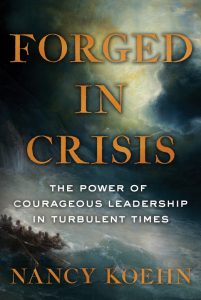Recently, I read an inspiring and insightful book about personal stories of five leaders – Ernest Shackleton, Abraham Lincoln, Fredrick Douglass, Dietrich Bonhoeffer, and Rachel Carson – and this helped me to reflect upon what it means being a leader in my life and how I can help my clients to develop their leadership identity. This reading was a source of learning and inspiration for my life and profession. The book is Forged in crisis: the power of courageous leadership in turbulent times by Nancy Koehn. The author captures your attention from the first lines bringing you on the incredible personal journey of each one of the 5 protagonists. Their lives, actions, words are the expression of the development of leadership skills, such as resilience, emotional intelligence, compassion and a clear vision. Each of these leaders lived in different historical periods, except for Lincoln and Douglass, they had different roles and purpose, but they shared their identity as servant leaders of their communities.
One of the things that mostly stands out is the number of challenges they faced during their life to affirm their ideas, to achieve their goals and leave an enduring legacy. Hence, courage was their distinctive element to overcome defeats and get out of moments of darkness and self-doubts. Courage is an important psychological trait required to face unprecedented times. Aristotle describes the virtue of courage, as perseverance in the face of adversity, as the mean between fear and audacity. It is a remarkable virtue because it helps people to face their internal and external challenges. These 5 leaders had the courage to perseverate and want to accomplish goals in the face of danger, uncertainty, risk, adversity, showing the character strengths of bravery, persistence, integrity, and vitality. 
All the five leaders had a deep dedication to a higher cause and the desire to realize something meaningful. The author often repeats that “leaders are not born, but made”, this statement is a clear invitation to see leadership as a skill that you learn and develop during your life through experience and self-reflection. Each of them was influenced by the external circumstances they grew up, for example, Lincoln was the son of farmers and in the first years he received a poor education, but he managed to cultivate his inner talents and become first a lawyer and then the president of the United States of America. These leaders constantly nurtured their talents and the desire of learning new things, improving themselves and use their knowledge to make something good. They leveraged self-reflection and emotional awareness to learn from their mistakes and adopt effective strategies to overcome obstacles and achieve their final aim.
During the moments of discouragement and difficulty, they showed resilience and were committed to navigating through the moment to endure. All this process was energy consuming, and feelings of hopelessness and vulnerability arose. Their stories are an example of how it is possible to thrive through challenges, shape the direction of your life, also if you were born in adverse circumstances, and leverage your inner talents to create something meaningful and positive in the world. They were not always confident of doing the right thing, but the passion for their ideals moved their actions.
Fundamentally, the main insight for me was that genes, culture, environment, psychological traits are all elements that influence the process to become a leader. The individual might become aware of the impact of all these elements and use them to shape their leadership identity.








